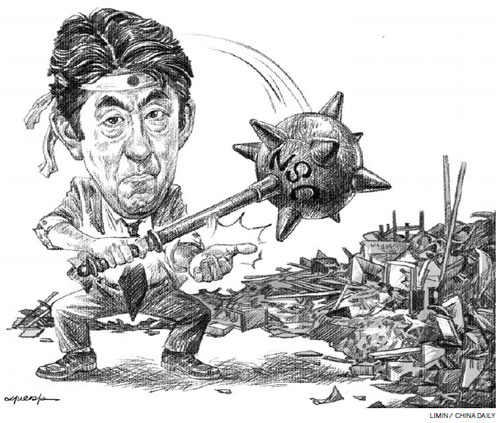Japan creates ominous council
Updated: 2013-12-09 07:19
By Wang Ping (China Daily USA)
|
||||||||
On Dec 4, 2013, Japan officially established its National Security Council, tasked with devising and strengthening the country's foreign and defense strategies. Japanese Prime Minister Shinzo Abe has said the NSC will enable the government to make strategic decisions on security and diplomacy to suit prevailing situations.
Different from Japan's previous security council that comprised nine ministers, the NSC has a framework under which the prime minister, foreign and defense ministers, and the chief cabinet secretary will meet once every fortnight to discuss security issues. The NSC's 60-member National Security Bureau, to be set up as part of the cabinet secretariat, will focus mainly on strategic coordination with its allies and friendly countries, strategic containment of China and the Democratic People's Republic of Korea, gathering information and centralizing strategic decisions.
The Abe government submitted the bill to set up a US-style security council in parliament on June 7, and the Upper House of the parliament approved it on Nov 27. A similar bill tabled in the parliament during Abe's first term as prime minister was dropped after he resigned in September 2007 after being in office for one year. Abe finally got the parliament to approve the establishment of the NSC in his second term.
The NSC will not only influence the diplomatic and strategic decision-making process of Japan, but also play a vital role in the security situation in the Asia-Pacific region.
First, the fortnightly meetings among the prime minister, foreign and defense ministers, and the chief cabinet secretary will make the role of the prime minister's office more important in foreign and defense policy matters and thus boost Abe's powers. Second, the NSC can help the Japanese government centralize information gathering and expedite the decision-making process in response to emergencies. And third, by labeling China and the DPRK as its "adversaries", Japan could create instability and heighten uncertainties in an already volatile East Asia.
The Abe cabinet is hell-bent on amending Japan's pacifist Constitution to clear the way for military buildup, and it is deliberately intensifying tensions in the region to fulfill this goal. But its provocative remarks and actions will not help its efforts to become a "normal country".
After the end of the Cold War, Japanese elites in the political, military and academic fields started thinking about the country's future security strategy. Following conservative think tanks' understanding of the world and the situation in Asia, they began seeing China as a "threat" or a "potential threat". When it comes to deepening exchanges between China and Japan, some Japanese still advocate a containment policy toward China. The reason is nothing but the baseless fear of China's rise and discomfort with the changing balance of power between China and Japan. The economic dividends that Japan has reaped because of China's economic reform and opening-up do not matter to them.
Abe wants to use a "new wave of nationalism" to boost Japanese people's morale, but his wrong reading of history has shamed the Japanese nation in front of the international community. Also, despite being a "nationalist", Abe will find it very difficult to establish a more equal Japan-US partnership given the nature of the Japan-US alliance.
The NSC will enable an institutional guarantee for Japan to work out a comprehensive national security strategy. But the criterion to evaluate the council's effectiveness is whether it can make rational security and diplomatic decisions, which can really enhance Japan's national interests. Japan's current diplomacy toward neighboring countries, which could stir up trouble in East Asia, is akin to seeking its own destruction. Until Japan gets rid of its status as a US "client state", its attempts to become a "normal country" will prove futile.
The creation of the NSC and the National Security Bureau as part of the cabinet secretariat will result in major changes in Japan's policy-making mechanism on foreign and security issues with a division between policy formulation and information processing. All kinds of information will be provided to the NSC to empower the prime minister and the other three cabinet officials to make all the vital decisions. And as a powerful think tank, the NSC will play a commanding, and devastating role in Japan's decision-making process and future strategic model.
The author is a researcher at the Institute of Japanese Studies, Chinese Academy of Social Sciences.

(China Daily USA 12/09/2013 page12)
Most Viewed
Editor's Picks

|

|

|

|

|

|
Today's Top News
DPRK leader's uncle stripped of all posts
United Way improves traction in China
China's inflation up 3% in Nov
China issues guidelines on official receptions
Winning season for ZTE USA and Rockets
3rd Plenum 'a success': expert
ROK decides to expand air defense zone
Trade surplus hit record high in Nov
US Weekly

|

|















